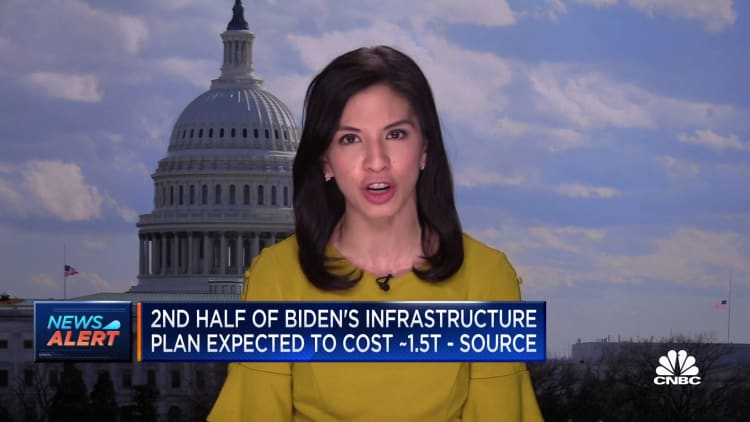President Joe Biden's next economic recovery package will cost at least $1 trillion and extend the beefed-up child tax credit, a source familiar with the proposal confirmed Tuesday.
Biden is set to follow the first phase of his infrastructure plan, a more than $2 trillion proposal, with a package known as the American Families Plan. While details are still in flux, the measure is expected to include roughly $1 trillion in new spending and $500 billion in tax credits, according to the source, who declined to be named.
The White House is expected to roll out the plan within days.
Biden's American Jobs Plan, which congressional Democrats have started to craft, calls to revamp roads, bridges, airports, broadband, utilities, housing and job training.
The second piece is expected to expand child care, paid leave, pre-K education and tax credits for families, while raising taxes on the wealthy. Those policies are priorities for progressives, who have said they want to address shortcomings in the social safety net exposed by the coronavirus pandemic, which disproportionately affect women in the labor market.
It would extend the strengthened child tax credit — which Democrats' coronavirus relief bill raised to as much as $3,600 per child per year — through 2025 but not make it permanent, CNBC confirmed. The Biden administration will likely move to offset the costs by hiking taxes on the wealthiest Americans, and is considering options including raising the top income tax rate to the pre-2017 level of 39.6% and taxing capital gains as ordinary income.
The Washington Post first reported details of the proposal.
In a statement, White House spokesman Michael Gwin said "President Biden has already put forward the first part of his historic plan to invest in the strength of America's economy and families, and he'll be outlining the second element of that proposal in the coming days."
"The details of that package are still being finalized, so speculation as to its final contents is premature at this point," he said.

After passage of its $1.9 trillion coronavirus relief plan last month, the White House moved on to its next priority in the infrastructure plans. Democrats face challenges in passing one or both parts of the recovery proposal.
The appetite for more spending among Republicans has shrunk since Biden took office. While the president has said he wants to strike an infrastructure deal with his GOP counterparts, Republican lawmakers have shown little desire to spend more than $800 billion — about a third of the price tag of Biden's first proposal.
The GOP has opposed Biden's push to hike the corporate tax rate to 28% as part of the initial infrastructure plan. Many Republican lawmakers will likely resist individual tax increases as part of the second phase, as well.
Some Democrats in Congress have floated the idea of working with Republicans to pass a smaller infrastructure bill based around transportation and broadband, then moving to pass child care, paid leave and education provisions on their own through budget reconciliation.
— CNBC's Thomas Franck contributed to this report.


